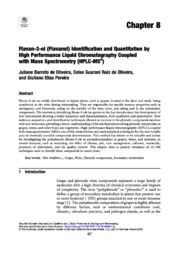Flavan-3-ol (Flavanol) identification and quantitation by high performance liquid chromatography coupled with mass spectrometry (HPLC-MSn).
Flavan-3-ol (Flavanol) identification and quantitation by high performance liquid chromatography coupled with mass spectrometry (HPLC-MSn).
Autoria: OLIVEIRA, J. B. DE; OLIVEIRA, C. G. R. de; PEREIRA, G. E.
Resumo: Flavan-3-ols are widely distributed in higher plants, such as grapes, located in the skins and seeds, being transferred to the wine during winemaking. They are responsible for specific sensory properties such as astringency, and bitterness, acting on the stability of the wine color, and taking part in the antioxidant compounds. The interest in identifying flavan-3-ols has grown in the last decades since the development of new instruments allowing a better separation and characterization, both qualitative and quantitative. New isolation, separation, and identification techniques allowed an increase in the phenolic compounds database with new structures, providing a better understanding of the mechanisms involving phenolic metabolism in grapes, wines, and other fruits and vegetables. High-performance liquid chromatography (HPLC) coupled with mass spectrometry (MS) is one of the most relevant and used analytical techniques for the non-volatile and/or thermally unstable compounds determination. This method has shown to be valuable and robust for investigating the polyphenols (flavan-3-ols or proanthocyanidins) in grapes, wines, and derivates, in several domains, such as evaluating the effect of climate, soil, vine management, cultivars, rootstocks, protocols of elaboration, and the quality control. This chapter aims to present variations of LC-MS techniques used to identify these compounds in recent years.
Ano de publicação: 2023
Tipo de publicação: Parte de livro (capítulos de livros, trabalhos e resumos publicados em anais ou em coletâneas)
Unidade: Embrapa Uva e Vinho
Palavras-chave: Grapes, Phenolic compounds, Secondary metabolites, Vitis vinifera L, Wines
Observações
1 - Por padrão são exibidas publicações dos últimos 20 anos. Para encontrar publicações mais antigas, configure o filtro ano de publicação, colocando o ano a partir do qual você deseja encontrar publicações. O filtro está na coluna da esquerda na busca acima.
2 - Para ler algumas publicações da Embrapa (apenas as que estão em formato ePub), é necessário ter, no celular ou computador, um desses softwares gratuitos. Sistemas Android: Google Play Livros; IOS: iBooks; Windows e Linux: software Calibre.
Acesse outras publicações
Acesse a Base de Dados da Pesquisa Agropecuária (BDPA) para consultar o acervo completo das bibliotecas da Embrapa.

